FRESH, September 20, 2022: Line 5 Must Reroute, But Not Shut Down, Judge Rules
September 20, 2022
Fresh is a biweekly newsletter from Circle of Blue that unpacks the biggest international, state, and local policy news stories facing the Great Lakes region today. Sign up for Fresh: A Great Lakes Policy Briefing, straight to your inbox, every other Tuesday.
— Laura Gersony, Fresh Editor
This Week’s Watersheds
- A federal judge rules that Enbridge must pay damages for trespassing on tribal lands in northern Wisconsin and reroute the Line 5 oil pipeline, but the pipeline can continue operating.
- A Michigan judge dismisses recreational anglers’ objections to Indigenous fish management practices.
- Rural Pennsylvania voters eye pro-fracking candidates in the upcoming midterms.
- Chicago enters the race to build the Great Lakes’ first offshore wind project.
- The EPA eyes a polluted site in Ann Arbor for a Superfund designation.
Local resistance impedes clean energy development in Ohio.
“Economic development and innovative energy technology is always welcome in the State of Ohio, but not at the expense of rural communities who do not want them.’”
— Matt Huffman, Ohio State Senate majority leader
One year ago, Ohio passed a law giving county commissioners the ability to veto large renewable energy projects. Since then, the Ohio Capital Journal reports, ten counties have taken the state up on that offer, passing resolutions that restrict or ban large wind and solar projects. The rules will slow clean energy development in the state, creating new risks and development hurdles for investors. The 2021 law marked a rare Republican-backed move to expand government intervention into landowners’ private property rights, and it created unlikely coalitions, with the state’s Chamber of Commerce and some Republicans joining Democrats to oppose the measure last year.
Fresh from the Great Lakes News Collaborative
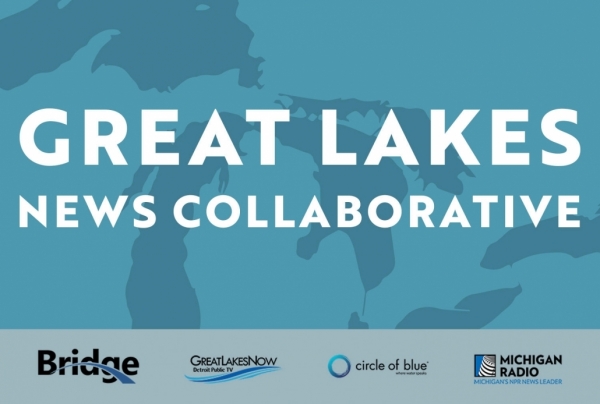
- Danger Looms Where Toxic Algae Blooms — Circle of Blue
- Farms in Six Southeast Michigan Counties are Major Sources of Lake Erie Toxic Blooms — Circle of Blue
- In a Year of Water Quality Reckoning, National Imperative is Impeded — Circle of Blue
The Great Lakes News Collaborative includes Bridge Michigan; Circle of Blue; Great Lakes Now at Detroit Public Television; and Michigan Radio, Michigan’s NPR News Leader. We work together to produce news and information about the impact of climate change, pollution, and aging infrastructure on the Great Lakes and drinking water. This independent journalism is supported by the Charles Stewart Mott Foundation. Find all the work here.

Line 5 Is Trespassing on Native Lands and Must Reroute, Judge Rules
A U.S. district court judge ruled that the Line 5 oil pipeline has been trespassing on certain tribal lands since 2013, when easements for those areas expired, the Wisconsin Examiner reports. The Bad River Band of the Lake Superior Tribe of Chippewa Indians had argued that the pipeline should be decommissioned because Enbridge, the Canadian company that operates Line 5, never renewed the easements. While the judge stopped short of ordering Enbridge to shut down Line 5, he did order the company to reroute the pipeline around the reservation within five years, an outcome that the tribe opposes. Enbridge must also pay damages for trespassing. The amount will soon be negotiated in court.
- Why it matters: Since it was constructed in the 1950s, Line 5 operated for 60 years with little attention. Circle of Blue picked up the story back in 2013, amid a sharp increase in public scrutiny in the United States to a continental boom in oil and natural gas production. Since then, the pipeline has been the subject of ongoing litigation and face-offs between Enbridge, tribal groups in the region, and the administration of Michigan Gov. Gretchen Whitmer.
In the News
TREATY RIGHTS: A federal judge has denied hunting and fishing advocacy groups greater influence in ongoing treaty rights negotiations, MLive reports. The two advocacy groups — the Coalition to Protect Michigan Resources and Bay de Noc Great Lakes Sports Fishermen — filed the request after a draft agreement emphasized Indigenous whitefish and lake trout management. A judge denied the request for full-party standing, arguing that only sovereign nations are eligible for that status.
SUPERFUND: The Environmental Protection Agency is beginning to test a contaminated underground site in Ann Arbor, Michigan, to see if it qualifies for the federal Superfund designation, the Detroit News reports. The site, once a manufacturing facility for medical filters, has been contaminated with dioxane, a likely carcinogen which does not easily break down in nature. The chemical has been spreading in an underground “plume” now one mile across, and has been detected in the drinking water of nearby Scio Township.
Looking Ahead
WIND POWER: Chicago may soon join New York and Ohio in the race to build the first wind project in the Great Lakes, the Chicago Tribune reports. An Illinois congressman has introduced a bill that would help the city build a wind power project in Lake Michigan. The project would be located about 10 miles off the shores of Chicago’s Southeast Side, an area historically burdened by industrial pollution. The bill, introduced by Rep. Marcus Evans, would establish a fund to help the city compete for federal infrastructure money.
FRACKING: Voters in gas-rich rural Pennsylvania are eyeing pro-fracking candidates in the upcoming midterms, Inside Climate News reports. Despite the risks the practice poses to water resources and health, fracking remains relatively popular among residents of rural Washington County, where oil and gas leasing has supported the local economy for decades. Some residents report health issues from contamination of their water and unfulfilled lease payouts. Others believe these concerns have been overblown. The governor’s race pits Josh Shapiro, the Democratic attorney general who supports regulation but not a ban on fracking, against Doug Mastriano, a state senator and vocal supporter of investment and deregulation of the state’s gas industry.
Upcoming Events
- September 21, 2022: Demystifying hazardous material spill preparedness — register
- September 27-29, 2022: Great Lakes Public Forum — register
- September 29, 2022: Interagency Ecological Restoration Quality Committee (IERQC) Monthly Webinar Series — register
- October 11-13, 2022: Great Lakes Commission Annual Meeting – register
Other News
- Debates over the risk of climate-related investments are galvanizing the usually quiet race for Minnesota’s state auditor.
- An anti-abortion bill in Pennsylvania could also undermine climate laws.
- An oil spill into Lake Ontario last year was linked to an ongoing trend of private equity purchasing fossil-fuelled power plants.
- A law firm hired to work on Ohio utility regulators’ public records requests has ties to the law at the center of an ongoing corruption scandal.
Laura Gersony covers water policy, infrastructure, and energy for Circle of Blue. She also writes FRESH, Circle of Blue’s biweekly digest of Great Lakes policy news, and HotSpots H2O, a monthly column about the regions and populations most at-risk for water-related hazards and conflict. She is an Environmental Studies and Political Science major at the University of Chicago and an avid Lake Michigan swimmer.

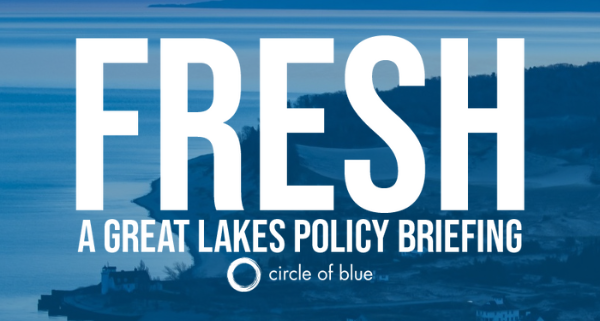

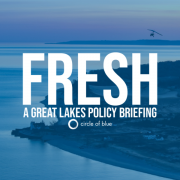

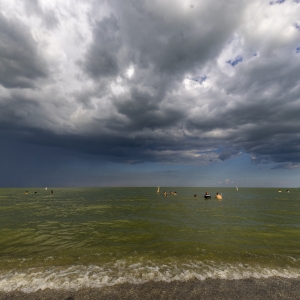
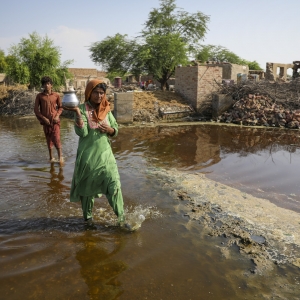
Leave a Reply
Want to join the discussion?Feel free to contribute!